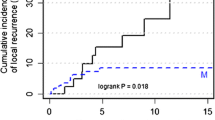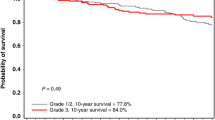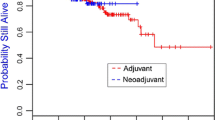Abstract
To estimate the 15-year survival following a diagnosis of stage I breast cancer among women who carry a BRCA1 mutation and to determine predictors of mortality, including the use of chemotherapy. Patients were 379 women with stage I breast cancer for whom a BRCA1 mutation had been identified, in herself or in a close family member. Patients were followed for up to 15 years from the initial diagnosis of breast cancer. Survival rates were estimated for women by age, tumor size (≤1 cm; >1 cm), ER status (±), and by chemotherapy (yes/no). 42 women died of breast cancer in the follow-up period (11.2 %). Survival rates were similar for women with cancers of size 0–1.0 cm and size 1.1–2.0 cm. Of the 267 women in the study who used chemotherapy, 21 had died (7.9 %) compared to 21 deaths among 112 women who did not receive chemotherapy (18.8 %; p = 0.002). The 15-year survival was 89.4 % for women who received chemotherapy and was 73.1 % for women who did not receive chemotherapy (p = 0.08; log rank). The adjusted hazard ratio for death following a diagnosis of stage I breast cancer associated with chemotherapy was 0.53 (95 % CI 0.28–1.07; p value 0.06) after adjusting for age of diagnosis, tumor size, and estrogen receptor status. This was statistically significant only among women with ER-negative breast cancers (HR = 0.28; 95 % CI 0.10–0.79; p = 0.02). BRCA1 positive women who are treated for stage I breast cancer with chemotherapy have better survival than those who do not receive chemotherapy. The difference cannot be explained by other prognostic factors. All women with invasive breast cancer and a BRCA1 mutation should be considered to be candidates for chemotherapy.



Similar content being viewed by others
References
Senn HJ, Thürlimann B, Goldhirsch A, Wood WC, Gelber RD, Coates AS (2003) Comments on the St. Gallen Consensus 2003 on the primary therapy of early breast cancer. Breast 12:569–582
Bharat A, Aft RL, Gao F, Margenthaler JA (2009) Patient and tumor characteristics associated with increased mortality in young women (< or =40 years) with breast cancer. J Surg Oncol 100:248–251
Narod SA, Foulkes WD (2004) BRCA1 and BRCA2: 1994 and beyond. Nat Rev Cancer 4:665–676
Foulkes WD, Metcalfe K, Hanna W, Lynch HT, Ghadirian P, Tung N et al (2003) Disruption of the expected positive correlation between breast tumor size and lymph node status in BRCA1-related breast carcinoma. Cancer 98:1569–1577
Rennert G, Bisland-Naggan S, Barnett-Griness O, Bar-Joseph N, Zhang S, Rennert HS et al (2007) Clinical outcomes of breast cancer in carriers of BRCA1 and BRCA2 mutations. N Engl J Med 357:115–123
Goodwin PJ, Phillips KA, West DW, Ennis M, Hopper JL, John EM et al (2012) Breast cancer prognosis in BRCA1 and BRCA2 mutation carriers: an International Prospective Breast Cancer Family Registry population-based cohort study. J Clin Oncol 30:19–26
Robson ME, Chappuis PO, Satagopan J, Wong N, Boyd J, Goffin JR et al (2004) A combined analysis of outcome following breast cancer: differences in survival based on BRCA1/BRCA2 mutation status and administration of adjuvant treatment. Breast Cancer Res 6:R8–R17
Metcalfe K, Lynch HT, Ghadirian P, Tung N, Olivotto I, Warner E, Olopade OI, Eisen A, Weber B, McLennan J, Sun P, Foulkes WD, Narod SA (2004) Contralateral breast cancer in BRCA1 and BRCA2 mutation carriers. J Clin Oncol 22:2328–2335
Byrski T, Gronwald J, Huzarski T, Grzybowska E, Budryk M, Stawicka M et al (2010) Pathological complete response rates in young women with BRCA1-positive breast cancers after neoadjuvant chemotherapy. J Clin Oncol 28:375–379
Dent R, Trudeau M, Pritchard KI, Hanna WM, Kahn HK, Sawka CA et al (2007) Triple-negative breast cancer: clinical features and patterns of recurrence. Clin Cancer Res 13:4429–4434
Bayraktar S, Gutierrez-Barrera AM, Liu D, Tasbas T, Akar U, Litton JK et al (2011) Outcome of triple-negative breast cancer in patients with or without deleterious BRCA mutations. Breast Cancer Res Treat 130:145–153
Lee LJ, Alexander B, Schnitt SJ, Comander A, Gallagher B, Garber JE et al (2011) Clinical outcome of triple negative breast cancer in BRCA1 mutation carriers and noncarriers. Cancer 117:3093–3100
Arun B, Bayraktar S, Liu DD, Gutierrez Barrera AM, Atchley D, Pusztai L et al (2011) Response to neoadjuvant systemic therapy for breast cancer in BRCA mutation carriers and noncarriers: a single-institution experience. J Clin Oncol 29:3739–3746
Warner E, Hill K, Causer P, Plewes D, Jong R, Yaffe M et al (2011) Prospective study of breast cancer incidence in women with a BRCA1 or BRCA2 mutation under surveillance with and without magnetic resonance imaging. J Clin Oncol 29:1664–1669
National Cancer Comprehensive Network (2011) NCNN Clinical Practice Guidelines in Oncology. National Comprehensive Cancer Network, Inc. http://www.nccn.org/professionals/physician_gls/f_guidelines.asp. Accessed 20 Dec 2012
Acknowledgments
We thank Fonds de la recherche en santé du Québec (FRSQ), the Canadian Breast Cancer Research Alliance and the Canadian Breast Cancer Foundation (Ontario Chapter) for their support. Also supported by the Polish Ministries of Science and Health.
Conflict of interest
The authors declare that they have no conflict of interest.
Author information
Authors and Affiliations
Corresponding author
Electronic supplementary material
Below is the link to the electronic supplementary material.
Rights and permissions
About this article
Cite this article
Narod, S.A., Metcalfe, K., Lynch, H.T. et al. Should all BRCA1 mutation carriers with stage I breast cancer receive chemotherapy?. Breast Cancer Res Treat 138, 273–279 (2013). https://doi.org/10.1007/s10549-013-2429-x
Received:
Accepted:
Published:
Issue Date:
DOI: https://doi.org/10.1007/s10549-013-2429-x




